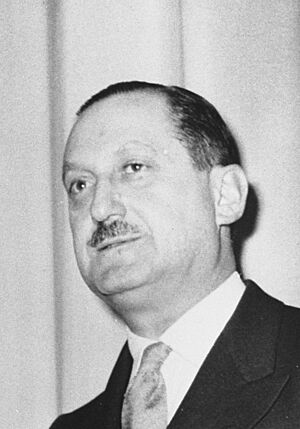Evangelos Averoff facts for kids
Quick facts for kids
Evangelos Averoff
|
|
|---|---|
| Ευάγγελος Αβέρωφ | |

Evangelos Averoff in 1959
|
|
| Minister of National Defence | |
| In office 24 July 1974 – 21 October 1981 |
|
| President | Phaedon Gizikis Michail Stasinopoulos Konstantinos Tsatsos Konstantinos Karamanlis |
| Prime Minister | Konstantinos Karamanlis Georgios Rallis |
| Succeeded by | Andreas Papandreou |
| Minister for Foreign Affairs | |
| In office 28 May 1956 – 20 September 1961 |
|
| Monarch | Paul |
| Prime Minister | Konstantinos Karamanlis |
| In office 4 November 1961 – 19 June 1963 |
|
| Leader of the Opposition and Leader of New Democracy | |
| In office 9 December 1981 – 1 September 1984 |
|
| Succeeded by | Konstantinos Mitsotakis |
| Personal details | |
| Born | 17 April 1910 Trikala |
| Died | 2 January 1990 (aged 79) Athens |
| Political party | Liberal Party Greek Rally National Radical Union New Democracy |
| Children | 2 |
Evangelos Averoff-Tossizza (Greek: Ευάγγελος Αβέρωφ Τοσίτσας) was an important Greek politician and author. He was born in Trikala on April 17, 1910, and passed away in Athens on January 2, 1990. He led the New Democracy party from 1981 to 1984 and served as a Member of Parliament for many years.
Contents
Early Life and Political Start
Evangelos Averoff was from the Aromanian community. He became involved in public life very early on. He played a big role in Greek politics for almost 50 years. In 1940, he became the Prefect, which is like a regional governor, of Kerkyra (Corfu).
During World War II
During the occupation of Greece in World War II, Mr. Averoff was taken as a hostage and put in prison in Italy. This happened because he tried to stop some important Aromanian families from working with the Italian forces in the Pindus region.
A year later, he managed to escape. He then created a resistance group called "Freedom or Death." This group worked to free Greek and Allied war prisoners.
After the War
In 1946, Evangelos Averoff was elected to the Greek Parliament. He represented the area of Ioannina. After that, he served as a deputy minister and later as a minister. He held important positions in areas like Supply, Economy, and Agriculture. From 1956 to 1963, he was the Minister for Foreign Affairs.
Resisting the Military Government
During the military rule in Greece from 1967 to 1974, Mr. Averoff took part in acts of resistance. He was arrested for his actions against the government.
Return to Democracy
After democracy was restored in 1974, a period known as metapolitefsi, Mr. Averoff joined the New Democracy party. This was a centre-right political party led by Konstantinos Karamanlis. He then served as the Minister of National Defense in several governments.
After the 1981 election, he became the President of the New Democracy party. At that time, his party was the main opposition in Parliament. He later stepped down in 1984 due to health reasons. He was then named an Honorary President of the party.
A Talented Author
Besides his political career, Evangelos Averoff was also a well-known author. He wrote many books, including novels, short stories, and plays. He also wrote essays and historical analyses.
Some of his notable works include "Customs Union in the Balkans" (1933), which won an award. He also wrote "Fire and Axe, 1944–1949" (1974), which was about the Greek Civil War. Another important book was "A History of missed opportunities: The Cypriot Problem 1956–1963" (1981).
Contributing to Metsovo
For the Aromanians living in Metsovo, Evangelos Averoff is remembered as the last in a long line of local helpers. He played a key role in starting the Foundation of Baron Michael Tositsas. He managed this foundation for 40 years. His work greatly helped the town of Metsovo develop and grow.
To honor the wish of Baron Michael Tossizza, who wanted the Foundation's President to share his family name, Evangelos Averoff added "Tossizza" to his own surname.
Evangelos Averoff Foundation
Evangelos Averoff also created the Evangelos Averoff-Tositsas Foundation. He gave his large personal collection of paintings by Greek artists to this foundation. He also built a special gallery to display these artworks.
At the same time, he invested in local vineyards in Metsovo. He helped cultivate abandoned lands and created a modern winery. After he passed away in 1990, the people of Metsovo honored him. They placed a statue of him in the town's central square.
Images for kids
 | Misty Copeland |
 | Raven Wilkinson |
 | Debra Austin |
 | Aesha Ash |


